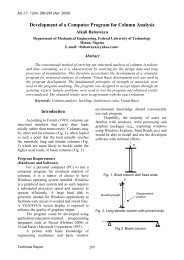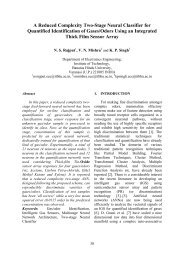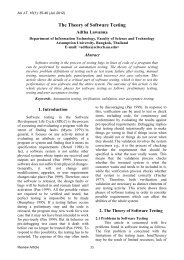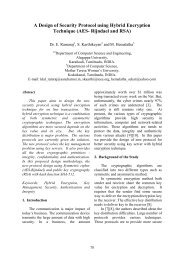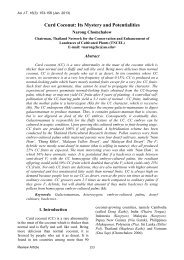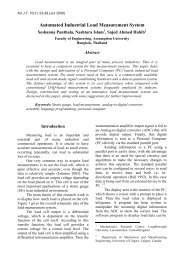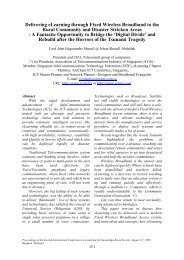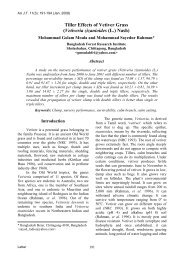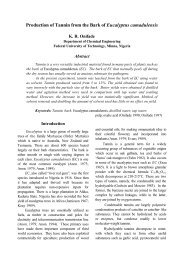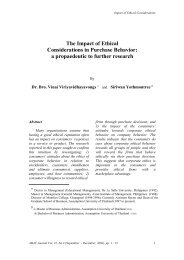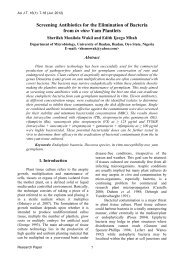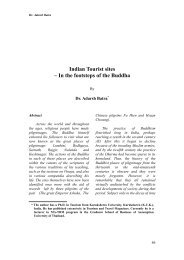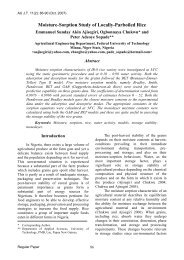PDF format - AU Journal
PDF format - AU Journal
PDF format - AU Journal
Create successful ePaper yourself
Turn your PDF publications into a flip-book with our unique Google optimized e-Paper software.
Prodding Shy Students into Active Participation through Gossiping<br />
Prodding Shy Students into Active Participation<br />
through Gossiping<br />
By<br />
San Shwe Baw*<br />
Abstract<br />
This article explores one possible<br />
way of exploiting one of our human<br />
weaknesses – a tendency to gossip – for<br />
language practice. It attempts to show<br />
how a number of interpersonal<br />
exchanges can be made by making use<br />
of our feelings for the people around us.<br />
The activity presented in this article,<br />
therefore, stresses the humanistic<br />
aspect of learning, and is intended to<br />
provide the learners with opportunities<br />
to talk and to listen with a<br />
communicative purpose in mind,<br />
thereby helping them to improve their<br />
fluency in English.<br />
The most distinctive trait that sets<br />
men apart from other animals as<br />
social animals is the ability to talk.<br />
But people talk only when there is<br />
something to talk about. Talking<br />
about the weather, prices of<br />
*The author has s a Bachelor of Arts (English) and a Master in TESOL (Vermont, USA). He also<br />
has a post-graduate diploma in ELT from Leeds University, U.K. He taught English at Rangoon<br />
University, Burma, from 1980 to 1991. Two of his articles dealing with communicative activities<br />
for language teaching have already been published by “The English Teaching Forum”, USA in<br />
1994 and 1996 respectively. Presently he is teaching English at the English Department of<br />
Assumption University and has published two articles in previous issues of this <strong>Journal</strong>.<br />
ABAC <strong>Journal</strong> Vol. 21 No.1 (January - April, 2001).
Prodding Shy Students into Active Participation through Gossiping<br />
commodities, health, appointments,<br />
travel and entertainment are just a few<br />
of the various topics that people often<br />
address in their daily conversation.<br />
Harmer. J (1997: P 46-47) generalizes<br />
about the nature of communication<br />
thus: Speakers say things because they<br />
want something to happen as a result of<br />
what they say. They may want to charm<br />
their listeners; they may want to give<br />
some in<strong>format</strong>ion or express pleasure.<br />
They may decide to be rude or to flatter,<br />
to agree or complain. In each of these<br />
cases they are interested in achieving a<br />
communicative purpose. In general – he<br />
continues to say about the listeners –<br />
people listen to language because they<br />
want to find out what the speaker is<br />
going to say - in other words what<br />
ideas they are conveying, and what<br />
effect they wish the communication to<br />
have. Oral fluency classes may benefit<br />
more if the activities used in the<br />
classroom reflect these basic<br />
characteristics necessary for effective<br />
communication. The tasks of the<br />
present-day language teachers,<br />
therefore, have become all the more<br />
challenging, as improving the students’<br />
capacities to use the language<br />
meaningfully largely depends on their<br />
ingenuity and hard work.<br />
Gossiping as a universal language<br />
function<br />
The topic “Prodding Shy Students<br />
into Active Participation through<br />
Gossiping” was born of my desire to<br />
give extended oral practice to students<br />
who remain rather inhibited in spite of<br />
having a working knowledge of<br />
grammar. In other words, this is an<br />
attempt to encourage less fluent<br />
students to talk with inspiration. The<br />
idea, in fact, had stemmed from Chafe’s<br />
notion of three types of involvement<br />
in conversation (1985:116): selfinvolvement<br />
of the speaker,<br />
interpersonal involvement between<br />
speaker and hearer, and involvement of<br />
the speaker with what is being talked<br />
about. Gossip, one of the commonest<br />
types of discourse that people of all<br />
times have engaged in, is very much<br />
characterized by the interactive nature<br />
of interaction. Moreover, gossipers tend<br />
to adopt the strategy of negatively<br />
evaluating non-present third parties, and<br />
the familiarity of their strategies makes<br />
the discourse and its meaning seem<br />
coherent, and allows for the elaboration<br />
of meaning through the play of familiar<br />
patterns (Tannen D.1996, P13). In<br />
Gregory Bateson’s words (1972), it<br />
sends a metamessage of rapport<br />
between the communicators, who<br />
thereby experience that they share<br />
communicative conventions and inhabit<br />
the same world of discourse. Few<br />
people can avoid gossiping in today’s<br />
world, where competition abounds in<br />
every sphere. The only difference will<br />
be the amount of gossip they engage in,<br />
depending on what type of people they<br />
are. Gossiping can therefore rightly be<br />
claimed as a universal language<br />
function.<br />
ABAC <strong>Journal</strong> Vol. 21 No.1 (January - April, 2001).
Prodding Shy Students into Active Participation through Gossiping<br />
Whom or what to be gossiped about?<br />
It could be embarrassing for the<br />
students if they were asked to gossip<br />
face to face about someone whom they<br />
all personally know. In some cases,<br />
they might even have to exchange<br />
angry words if the person chosen for<br />
gossiping has relatives or friends in the<br />
gossiping group. On the other hand,<br />
choosing some imaginary person may<br />
not help produce inspired gossip, as<br />
meaning and mental images come only<br />
when connection is made with the<br />
learners’ own world of experience<br />
(Lindstromberg 1990: xi). Yet we are<br />
not devoid of raw materials.<br />
Newspaper, television, and radio can<br />
provide us with news of the meanest<br />
persons on earth. Depending on the<br />
students’ tastes, the person chosen for<br />
the gossiping – the raw material in our<br />
situation - can be a sportsman, a<br />
politician, a leader of a country, a<br />
criminal, a businessman or even people<br />
blacklisted by history. If the learners are<br />
mature and understanding, the person to<br />
be gossiped about may even be chosen<br />
from another group in the classroom.<br />
One alternative, which will not only<br />
save a lot of class time but also help the<br />
inhibited students to break the ice, is the<br />
one in which the teacher gives each<br />
member of the group two or three<br />
different pieces of written in<strong>format</strong>ion<br />
about the person to be gossiped about –<br />
someone whom everybody in the<br />
groups knows to a certain extent. The<br />
main purpose of this whole activity is<br />
only to help the learners to talk with<br />
meaning – to talk in a context. It is an<br />
example of how a number of<br />
interpersonal exchanges can be made by<br />
making use of our feelings for the<br />
people around us. It is hoped that they<br />
will expand once they get motivated.<br />
The gossipers may add as much gossip<br />
as they can imagine, so long as they are<br />
using English.<br />
Who gossiped how?<br />
The students I did this activity with<br />
are upper intermediate level students<br />
studying at Assumption University,<br />
Thailand. Many of the learners are shy<br />
types, though fairly well-grounded in<br />
grammar. Their ages range between 18<br />
to 22. In order that all the participants<br />
might have sufficient opportunity to<br />
express themselves, I prolonged the<br />
activity by leading the students through<br />
three stages. The person chosen to be<br />
gossiped about for that very first time<br />
was myself – their teacher- though the<br />
facts given to them for gossiping were<br />
meant only for fun. For the sake of<br />
effectiveness, each gossip group did not<br />
exceed three members – an appropriate<br />
size for gossiping. Groups were formed<br />
on the basis of intimacy among<br />
members for the first round of<br />
gossiping, so as to produce the mostinspired<br />
gossip. It was hoped that<br />
students, in the process of gossiping<br />
using the given in<strong>format</strong>ion, would get<br />
motivated and start using a variety of<br />
tenses, positive and negative<br />
statements, questions, and the like<br />
whenever the occasion arose. For<br />
example, one might start with the<br />
ABAC <strong>Journal</strong> Vol. 21 No.1 (January - April, 2001).
Prodding Shy Students into Active Participation through Gossiping<br />
gossip, “ San (my name) is very short,<br />
but he loves tall women. Don’t you<br />
think he is foolish?” Another might<br />
reply, “ But the funny thing is that he<br />
has never been in love. No woman<br />
loves him.”<br />
Real classroom experience<br />
This is how I conducted this<br />
activity with my students. First, I<br />
briefly explained to the class the nature<br />
of the activity and got the participants<br />
to sit in groups of three. Eight groups<br />
emerged out of the 24 students. When<br />
all the group members were<br />
comfortably seated in their respective<br />
groups, a small piece of paper<br />
containing three different gossip items<br />
was distributed to each group member.<br />
Here are some examples of the<br />
gossip items that I used in the<br />
activity:<br />
/ never keeps promises/ / never<br />
good to friends/ / too fond of<br />
beautiful girls/ / always forgets to<br />
return borrowed money / /<br />
interested in sleeping and eating<br />
only/ / stays aloof/ / stingy/ / never<br />
neat and tidy/ /very lazy/ / knows<br />
little, but very boastful/ / looks<br />
down on people who cannot speak<br />
English / / has a marked accent/ /<br />
not helpful/ / no sense of duty/ /<br />
assumes no responsibility for his<br />
family/ / never admits his faults/ /<br />
envies people around him/ / very<br />
greedy and selfish/ / likes flattery/ /<br />
does not believe in any religion/ /<br />
teacher in name only, doesn’t<br />
know how to teach / / very short,<br />
but loves tall women / / very ugly,<br />
no woman loves him/ / likes<br />
gambling/ / drinks like a fish/ /<br />
always late for appointments/ /<br />
fawns on the rich and the powerful/<br />
/ has no sympathy for the poor and<br />
uneducated/ / always pessimistic / /<br />
socks always smelly/ and so on.<br />
The first phase of the activity took<br />
nearly ten minutes. Some students<br />
chuckled, while others grinned as they<br />
gradually got absorbed in the activity.<br />
But one noticeable thing – a very<br />
unnatural phenomenon in our situation<br />
– was that nobody remained passive.<br />
They listened and talked by turns, each<br />
curious to know what his/her peers had<br />
to say about their teacher, and eager to<br />
tell them about the in<strong>format</strong>ion s/he<br />
had. My duty, as a teacher, was going<br />
round the class to check if<br />
communication was really taking place,<br />
and to give assistance to the students<br />
should they need it.<br />
The second phase was carried out<br />
in a similar fashion. When everyone in<br />
each group had finished gossiping to<br />
their heart’s content, new groups of<br />
three were formed randomly and each<br />
group was asked to gossip again using<br />
all the in<strong>format</strong>ion they had gained in<br />
the previous round, thus creating as<br />
vivid an image of the gossiped-about<br />
person as possible. To make the<br />
language sound more natural, the<br />
gossipers in this phase of activity were<br />
not allowed to look at the written<br />
ABAC <strong>Journal</strong> Vol. 21 No.1 (January - April, 2001).
Prodding Shy Students into Active Participation through Gossiping<br />
in<strong>format</strong>ion at all. They were made to<br />
speak whatever they had to say out of<br />
their memory. Knowing that what one<br />
participant knew about the gossipedabout<br />
person was not known by another<br />
participant, each student contributed<br />
eagerly whatever s/he knew to the<br />
group. Emboldened by the experience<br />
they had gained from the first round of<br />
gossip, some students began to add<br />
made-up gossip items into their talk,<br />
thus further enlivening the classroom<br />
atmosphere. It is to be acknowledged,<br />
however, that the majority of the<br />
students at this stage were occupied<br />
only with “Reported gossip”, that is, a<br />
speaker framing an account of another’s<br />
words as dialogue. Anyway, this type of<br />
production is still a lot better than when<br />
they say nothing as some researchers on<br />
sociolinguistics are optimistic that this<br />
discourse type can enhance our image<br />
of the individual speaking. Tannen<br />
(1996, P 109) claims that when a<br />
speaker represents an utterance as the<br />
words of another, what results is<br />
constructed dialogue. To conclude that<br />
the act of transforming others’ words<br />
into one’s own discourse is a creative<br />
and enlivening one, she further quotes<br />
Bakhtin ([1975] 1981:338), who<br />
observes that every conversation is full<br />
of transmissions and interpretations of<br />
other people’s words. This activity took<br />
about 15 minutes but might have<br />
continued longer if I had not intervened<br />
to introduce the third phase of the<br />
activity.<br />
The last activity was conducted by<br />
two handpicked, fluent students (two<br />
students who had studied in America<br />
for a few years) in front of the whole<br />
class. The purpose of this activity was<br />
to give the rest of the class a chance to<br />
watch the two students as their models<br />
while they were engaged in<br />
conversation. To do this activity, I<br />
made up a dramatic situation about the<br />
person being gossiped about and asked<br />
the two to expand on it. I created that<br />
dramatic situation by showing the<br />
following piece of in<strong>format</strong>ion to the<br />
class on the overhead projector.<br />
Obituary<br />
Unexpected death of San<br />
San, the founder of the Akyab<br />
lonely heart club, breathed his<br />
last while watching a pretty girl<br />
coming towards him with a red<br />
rose in her right hand and a<br />
handkerchief in her left hand.<br />
The funeral procession will<br />
....................<br />
The students were allowed 3<br />
minutes to reflect on this dramatic<br />
change of fate, and then the two most<br />
active and fluent students were called<br />
upon to come to the front of the<br />
classroom to discuss the topic “THE<br />
SAN I USED TO KNOW” while the<br />
remaining students watched them as<br />
their models. Though no particular<br />
instruction was given as to how that<br />
activity should be conducted, they built<br />
their discussion around the mysterious<br />
ABAC <strong>Journal</strong> Vol. 21 No.1 (January - April, 2001).
Prodding Shy Students into Active Participation through Gossiping<br />
nature of San’s death, and kept the<br />
conversation going using whatever idea<br />
that struck them at that moment. The<br />
rest of the class just watched on,<br />
motivated by this display.<br />
Conclusion<br />
The speech activity presented in<br />
this article is not intended to teach<br />
students how to speak. Rather it is an<br />
attempt to help them to speak by<br />
making use of their feelings for other<br />
people around them. In fact,<br />
contemporary theorists in pragmatics<br />
are now emphasizing the importance<br />
of affect on language learning.<br />
Quoting Becker (1979), M.C. Bateson<br />
(1984), Friedrich (1986) and Tyler<br />
(1978), Tannen states that emotion<br />
and cognition are inseparable.<br />
Understanding, she says, is facilitated,<br />
even enabled, by emotional experience<br />
of interpersonal involvement.<br />
Schumann (1994: 232) points out that<br />
emotion and cognition are<br />
distinguishable but inseparable. He<br />
concludes, therefore, that affect is an<br />
integral part of cognition. Though<br />
accuracy, in terms of formal<br />
correctness, cannot be achieved through<br />
this suggested activity, it definitely<br />
worked well with my students whose<br />
fluency in English was still below par.<br />
Through it, they were enabled to tap<br />
into the largely passive grammatical<br />
knowledge, and to extend their<br />
conversational range.<br />
****<br />
References<br />
Bakhtin, M. M. [1975]1981. The<br />
dialogic imagination. Austin: The<br />
University of Texas Press.<br />
Bateson, G. 1972. Steps to an ecology<br />
of mind. New York: Ballantine.<br />
Bateson, M. C. 1972. Our own<br />
metaphor: A personal account of a<br />
conference on conscious purpose<br />
and human adaptation. New York:<br />
Smithsonian Institution Press.<br />
Becker, A. L. 1979. Text-building,<br />
epistemology, and aesthetics in<br />
Javanese Shadow<br />
Theatre. The imagination of reality,<br />
ed. By A. L. Becker and Aram<br />
Yengoyan, 211-43. Norwood, NJ:<br />
Ablex.<br />
Chafe, .W. L. 1985. Linguistic<br />
differences produced by<br />
differences between speaking and<br />
ABAC <strong>Journal</strong> Vol. 21 No.1 (January - April, 2001).
Prodding Shy Students into Active Participation through Gossiping<br />
writing. Literacy, language and<br />
learning: the nature and<br />
consequences of reading and<br />
writing, ed. By David R.. Olson,<br />
Nancy Torrance, and Angela<br />
Hildyard, 105-23. Cambridge:<br />
Cambridge University Press.<br />
Friedrich, P. 1986. The language<br />
parallax: Linguistic relativism and<br />
poetic indeterminacy. Austin,TX:<br />
University of Texas Press.<br />
Harmer, J. 1997. The practice of<br />
English Language Teaching.<br />
Longman.<br />
Lindstromberg, S. 1990. The recipe<br />
book. Harlow: Longman.<br />
Schumann, J. 1994. Where is<br />
cognition? Studies in Second<br />
Language Acquisition 16: 231-42.<br />
Tannen, D. 1996. Talking Voices.<br />
Repetition, dialogue, and imagery<br />
in conversational discourse.<br />
Cambridge University Press.<br />
Tyler, S. 1978. The said and unsaid.<br />
New York: Academic Press.<br />
****<br />
ABAC <strong>Journal</strong> Vol. 21 No.1 (January - April, 2001).



